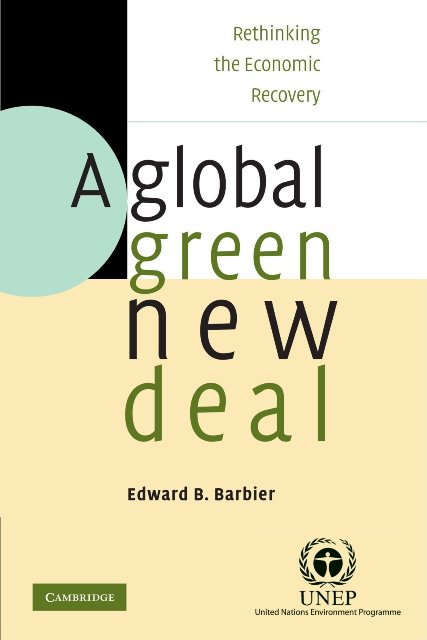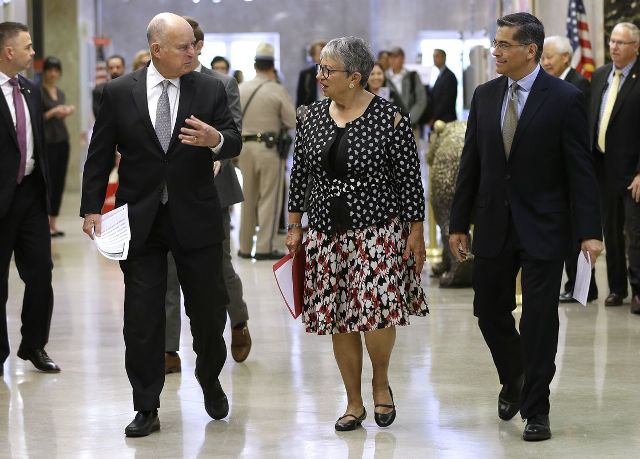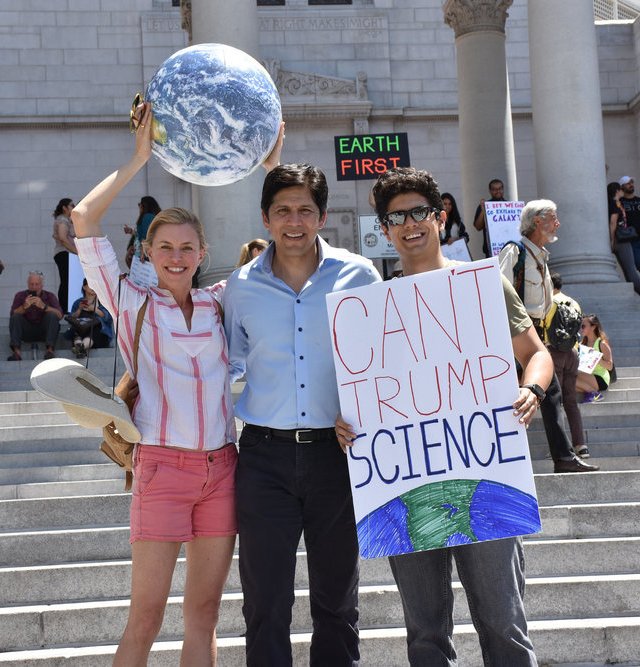Green New Deal: Difference between revisions
Siterunner (talk | contribs) No edit summary |
Siterunner (talk | contribs) No edit summary |
||
| Line 9: | Line 9: | ||
''The plan seemed like a “no-brainer’’ after recent discussions between House Republicans and Democrats about infrastructure as an area where the two parties could find common ground.'' | ''The plan seemed like a “no-brainer’’ after recent discussions between House Republicans and Democrats about infrastructure as an area where the two parties could find common ground.'' | ||
* [https://www.nbcnews.com/think/opinion/california-fire-democrats-control-house-it-s-time-get-serious-ncna936976 '''''Via NBC / Democrats: Time to Get Serious, a Green New Deal'''''] | |||
* [https://www.thenation.com/article/can-the-blue-wave-deliver-a-green-new-deal/ '''''Via The Nation / Can the Blue Wave Deliver a Green New Deal?'''''] | * [https://www.thenation.com/article/can-the-blue-wave-deliver-a-green-new-deal/ '''''Via The Nation / Can the Blue Wave Deliver a Green New Deal?'''''] | ||
| Line 208: | Line 210: | ||
····················································································· | ····················································································· | ||
<big>'''''"Eco-nomics" @GreenPolicy360, Greening the Economy'''''</big> | |||
| Line 255: | Line 261: | ||
[[Category:City-County Governments]] | [[Category:City-County Governments]] | ||
[[Category:Clean Water]] | [[Category:Clean Water]] | ||
[[Category:Climate Change]] | |||
[[Category:Climate Policy]] | [[Category:Climate Policy]] | ||
[[Category:Earth]] | [[Category:Earth]] | ||
| Line 266: | Line 273: | ||
[[Category:Food]] | [[Category:Food]] | ||
[[Category:Forests]] | [[Category:Forests]] | ||
[[Category:Global Warming]] | |||
[[Category:Green Best Practices]] | [[Category:Green Best Practices]] | ||
[[Category:Green Banking]] | [[Category:Green Banking]] | ||
| Line 280: | Line 288: | ||
[[Category:New Definitions of National Security]] | [[Category:New Definitions of National Security]] | ||
[[Category:New Economy]] | [[Category:New Economy]] | ||
[[Category: | [[Category:Renewable Energy]] | ||
[[Category:Resilience]] | [[Category:Resilience]] | ||
[[Category: | [[Category:Sea-Level Rise & Mitigation]] | ||
[[Category:Solar Energy]] | |||
[[Category:Strategic Demands]] | [[Category:Strategic Demands]] | ||
[[Category:Sustainability Policies]] | [[Category:Sustainability Policies]] | ||
Revision as of 14:10, 23 November 2018
U.S. Environmentalists Welcome Wins By “Green New Deal’’ Candidates
“I can’t imagine under the Trump administration that anything labelled a `Green New Deal’ would be successful, especially if it is framed in terms of climate change.”
The plan seemed like a “no-brainer’’ after recent discussions between House Republicans and Democrats about infrastructure as an area where the two parties could find common ground.
·································
Green New Deal / Origins in the UK / Green New Deal Group
·································
Via Politico / November 15, 2018 / Ocasio-Cortez’s ‘Green New Deal’ Becomes Flash Point for Pelosi
Proposal for Select Committee on a Green New Deal / Alexandria Ocasio-Cortez
(A) The Plan for a Green New Deal (and the draft legislation) shall be developed in order to achieve the following goals, in each case in no longer than 10 years from the start of execution of the Plan:
- (1) 100% of national power generation from renewable sources;
- (2) Building a national, energy-efficient, “smart” grid;
- (3) Upgrading every residential and industrial building for state-of-the-art energy efficiency, comfort and safety;
- (4) Decarbonizing the manufacturing, agricultural and other industries;
- (5) Decarbonizing, repairing and improving transportation and other infrastructure;
- (6) Funding massive investment in the drawdown and capture of greenhouse gases;
- (7) Making “green” technology, industry, expertise, products and services a major export of the United States, with the aim of becoming the undisputed international leader in helping other countries transition to completely carbon neutral economies and bringing about a global Green New Deal.
(B) The Plan for a Green New Deal (and the draft legislation) shall recognize that a national, industrial, economic mobilization of this scope and scale is a historic opportunity to virtually eliminate poverty in the United States and to make prosperity, wealth and economic security available to everyone participating in the transformation. In furtherance of the foregoing, the Plan (and the draft legislation) shall:
- (i)provide all members of our society, across all regions and all communities, the opportunity, training and education to be a full and equal participant in the transition, including through a job guarantee program to assure every person who wants one, a living wage job;
- (ii) take into account and be responsive to the historical and present-day experiences of low-income communities, communities of color, indigenous communities, rural and urban communities and the front-line communities most affected by climate change, pollution and other environmental harm;
- (iii)mitigate deeply entrenched racial, regional and gender-based inequalities in income and wealth (including, without limitation, ensuring that federal and other investment will be equitably distributed to historically impoverished, low income, deindustrialized or other marginalized communities);
- (iv) include additional measures such as basic income programs, universal health care programs and any others as the select committee may deem appropriate to promote economic security, labor market flexibility and entrepreneurism; and
- (v) deeply involve national and local labor unions to take a leadership role in the process of job training and worker deployment.
(C) The Plan for a Green New Deal (and the draft legislation) shall recognize that innovative public and other financing structures are a crucial component in achieving and furthering the goals and guidelines relating to social, economic, racial, regional and gender-based justice and equality and cooperative and public ownership set forth in paragraphs (2)(A)(i) and (6)(B). The Plan (and the draft legislation) shall, accordingly, ensure that the majority of financing of the Plan shall be accomplished by the federal government, using a combination of the Federal Reserve, a new public bank or system of regional and specialized public banks, public venture funds and such other vehicles or structures that the select committee deems appropriate, in order to ensure that interest and other investment returns generated from public investments made in connection with the Plan will be returned to the treasury, reduce taxpayer burden and allow for more investment.
·································
Democrats’ Green New Deal Wing Takes Shape Amid Wave Of Progressive Climate Hawk Wins
The rise of Democrats who support policy that might actually make a difference on climate pollution / 11/07/2018
Supporters of a Green New Deal are gaining power in the very election that’s bleeding the bipartisan Climate Solutions Caucus. The 90-member club ― derided as “peacocks” by critics who say it served only to launder the reputations of members who consistently vote against climate policies ― lost several members...
"This is the sort of bold and audacious thinking that we need when it comes to confronting the ever-pressing challenge of averting catastrophic climate change." -- Michael Mann, climate scientist at Penn State University
Washington State Rejects Carbon Fee
California Climate Leader Kevin de León Defeated in Senate Bid
·································
A "Green New Deal"?
Is the U.S. ready for a rapid transition to a clean energy economy?
Via Huffington Post / Democrats Increasingly Support The Idea Of A Green Jobs Plan
A New Deal-style program is the kind of plan scientists say could actually make a difference on climate-changing emissions.
········································································
A "Green New Deal" on the Ballot in Washington State
October 2018 / Via Vox
With the federal government AWOL on climate change, another state steps up.
With President Donald Trump’s administration dismantling federal climate policy as fast as it can, all eyes have turned to the states. As last month’s Global Climate Action Summit in California illustrated, state leaders are stepping forward with big promises and inspirational rhetoric, attempting to rally the domestic troops, build some momentum, and signal to the world that the US isn’t a lost cause.
Washington I-1631
1631 is a fee. That’s not just semantics — in Washington, it matters. A tax goes into general revenue (even if it is offset by tax cuts). All the revenue from a fee must be devoted to the purpose of the fee.
Of the 1631 revenue:
- 70 percent would go to “clean air and clean energy.” 15 percent of that would go specifically to easing the burden on low-income energy consumers. $12 million would go to a fund that helps ease fossil fuel workers transition out of the industry.
- 25 percent would go to “clean water and healthy forests,” increasing the resilience of the state’s natural ecosystems to climate change.
- 5 percent would go to “healthy communities,” assisting (especially rural) communities impacted by climate change.
Re: the initiative's fees ... beginning with a carbon tax, estimated to raise an average of about $900 million per year even starting with a low-end tax rate of $15 per ton of carbon.
An analysis by economist Robert Pollin and colleagues at the Political Economy Research Institute concluded that “clean energy investments in Washington State that would be sufficient to put the state on a true climate stabilization trajectory will generate about 40,000 jobs per year within the state.”
File:Green New Deal - WashingtonState 12-23-17.pdf
https://www.greenpolicy360.net/mw/images/Green_New_Deal_-_WashingtonState_12-23-17.pdf
The result of I-1631 would be a rolling wave of investments across the state, to the tune of around a billion dollars a year, for decades to come. Here is I-1631 map showing the types of local investments that could be funded by carbon revenue:
○
Political Policies Call for a Green New Deal
California 'Out in Front'
California out in front in a Green future
California moves to the front with green initiatives
https://www.greenpolicy360.net/w/Governor_Jerry_Brown
○
Progressive candidates campaign on green politics and eco-nomics
A sustainable and just environmental plan is not only good policy, it’s good politics
Origins of the political term "Green New Deal":
In 2008 Barack Obama added a Green New Deal to his platform.
When he took office in January 2009 and he inherited what many called the weakest American economy since the Great Depression. Facing the challenge, he made energy the centerpiece of his economic recovery plan. In one bold move, President Obama launched what was called the “Green New Deal.”
In 2009, the United Nations drafted a report calling for a Global Green New Deal to focus government stimulus on renewable energy projects.
··················································
Support for a Green New Deal
Kevin de León / California
Today, our economy is creating less of the jobs we need to keep our country standing strong, and more of the greenhouse gases that will bring our planet to its knees. In California, we've been working on policies that cut emissions, boost renewable energy production, and – most importantly – create stable, high-paying jobs with meaning. We can get the U.S. on the right track, too, but we won’t get there by keeping coal companies on life support, gutting the EPA, and leaving communities of color the doctor’s bills that fossil fuel production always brings. And we can’t get there on the freeways we built in the 1950’s.
That’s why I’m calling for a Green New Deal. We need a comprehensive plan to restore the infrastructure that brings our country together, and to do it sustainably, in a way that totally caps carbon emissions and sets our nation on track to consume only renewable energy by 2045. Doing so will reduce our dependence on fossil fuels and foreign countries, shore up our national security, and we know it will create jobs: today, California’s clean energy sector supports ten times the jobs that the entire nation’s coal industry does. A Green New Deal will make our country safer and more self-sufficient, and it will create jobs that cannot be outsourced.
I wrote SB 350, the law that requires fifty percent of the Golden State’s energy consumption must be renewable by 2030, and I stared down Big Oil to get it passed. Today, the landmark renewable energy commitments that I shepherded to safe passage have pushed California to meet that goal years in advance and created thousands of green jobs for hardworking Californians. Now, we're in the home stretch of passing a bill to commit California to 100% renewables by 2045. Those accomplishments, and the $5.4 billion we’ll invest in new infrastructure this decade are proof positive that environmental stewardship and astounding economic growth go hand in hand. We can build an economy that provides a fair shot at the dignity of a good-paying job for every working family, in a way ensures a cleaner, greener future for the next generation.
A Green New Deal can be more than a pie-in-the-sky ideal. With the right Congress, we can write it into reality.
- Kevin de León (@kdeleon)
·····················································································
"Eco-nomics" @GreenPolicy360, Greening the Economy
Sustainable Eco-nomics, Renewable Energy, Green Jobs, Protection of 'The Commons'
○
- Eco-nomics
- Green Politics
- Air Quality
- Alternative Agriculture
- Aquifers
- Atmosphere
- Biodiversity
- City-County Governments
- Clean Water
- Climate Change
- Climate Policy
- Earth
- Ecological Economics
- Ecology Studies
- Economic Development
- Economics
- Environmental Protection
- Environmental Security
- EOS eco Operating System
- Food
- Forests
- Global Warming
- Green Best Practices
- Green Banking
- Green Business
- Green Infrastructure
- Green Values
- Health
- Initiatives
- Labor Issues
- Labor Unions
- Natural Resources
- Networking
- New Definitions of National Security
- New Economy
- Renewable Energy
- Resilience
- Sea-Level Rise & Mitigation
- Solar Energy
- Strategic Demands
- Sustainability Policies
- Toxics and Pollution
- UK
- US


